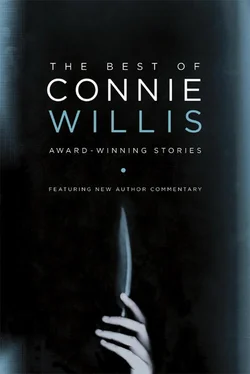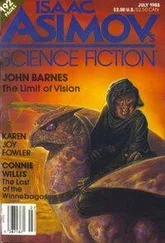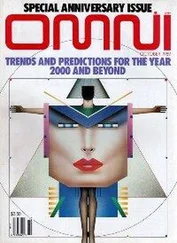He felt it, I thought, and started toward him, but he was already getting on the train, the doors were already starting to close. Even running, I wouldn’t reach him.
I bounded onto the nearest car as the doors whooshed shut and stood there just inside the door, waiting for the next station. As soon as the doors opened I jumped out, holding on to the edge of the door, to see if he got off. He didn’t, or at the next station, and Bond Street was easy. Nobody got off.
“Marble Arch,” the disembodied voice said, and the train pulled into the tiled station.
What the hell was at Marble Arch? There had never been this many people when Cath and I stayed at the Royal Hernia.
Everybody on the train was getting off.
But was the old man? I leaned out from the door, trying to see if he’d gotten off.
I couldn’t see him for the crowd. I stepped forward and was immediately elbowed aside by an equally large herd of people getting on.
I headed down the platform toward his car, craning my neck to spot his plaid jacket, his grizzled head in the exodus.
“The doors are closing,” the voice of the Tube said, and I turned just in time to see the train pull out, and the old man sitting inside, looking out at me.
And now what? I thought, standing on the abruptly deserted platform. Go back to Holborn and see if it happened again and somebody else felt it? Somebody who wasn’t getting on a train.
Certainly nothing was going to happen here. This was our station, the one we had set out from every morning, come home to every night, the first time we were here, and there hadn’t been any strange winds. The Royal Hernia was only three blocks away, and we had run up the drafty stairs, holding hands, laughing about what the Old Man had said to the verger in Canterbury when he had shown us Thomas More’s grave—
The Old Man. He would know what was causing the winds, or how to find out. He loved mysteries. He had dragged us to Greenwich, the British Museum, and down into the crypt of St. Paul’s, trying to find out what had happened to the arm Nelson lost in one of his naval battles. If anybody could, he’d find out what was causing these winds.
And he should be here by now, I thought, looking at my watch. Good God. It was nearly one. I went over to the tube map on the wall to find the best way over to the conference. Go to Notting Hill Gate and take the District and Circle Line. I looked up at the sign above the platform to see how long it would be till the next train, so that when the wind hit, I didn’t have time to hunch down the way the old man had, to flinch away from the blow. My neck was fully extended, like Sir Thomas More’s on the block.
And it was like a blade, slicing through the platform with killing force. No charnel house smell this time, no heat. Nothing but blast and the smell of salt and iron. The scent of terror and blood and sudden death.
What is it? I thought, clutching blindly for the tiled wall. What are they?
The Old Man, I thought again. I have to find the Old Man.
I took the Tube to South Kensington and ran all the way to the conference, half-afraid he wouldn’t be there, but he was. I could hear his voice when I came in. The usual admiring group was clustered around him. I started across the lobby toward them.
Elliott detached himself from the group and came over to me.
“I need to see the Old Man,” I said.
He put a restraining hand on my arm. “Tom—” he said.
He looked like Cath had, sitting on the bed, telling me Sara was having an affair.
“What’s wrong?” I asked, dreading the answer.
“Nothing,” he said, glancing back toward the lounge. “Arthur—nothing.” He let go of my arm. “He’ll be overjoyed to see you. He’s been asking for you.”
The Old Man was sitting in an easy chair, holding court. He looked exactly the same as he had twenty years ago, his frame still lanky, his light hair still falling boyishly over his forehead.
See, Cath, I thought. No long white beard. No cane.
He broke off as soon as he saw us and stood up. “Tom, you young reprobate!” he said, and his voice sounded as strong as ever. “I’ve been waiting for you to get here all morning. Where were you?”
“In the Tube,” I said. “Something happened. I—”
“In the Tube ? What were you doing down in the Tube?”
“I was—”
“Never use the Tube anymore,” he said. “It’s gone completely to hell ever since Tony Blair got into office. Like everything else.”
“I want you to come with me,” I said. “I want to show you something.”
“Come where?” he said. “Down in the Tube? Not on your life.” He sat back down. “I loathe the Tube. Smelly, dirty…”
He sounded like Cath.
“Look,” I said, wishing there weren’t all these people around. “Something peculiar happened to me in Charing Cross Station yesterday. You know the winds that blow through the tunnels when the trains come in?”
“I certainly do. Dreadful drafty places—”
“Exactly,” I said. “It’s the drafts I want you to see. Feel. They—”
“And catch my death of cold? No, thank you.”
“You don’t understand,” I said. “These weren’t ordinary drafts. I was heading for the Northern Line platform, and—”
“You can tell me about it at lunch.” He turned back to the others. “Where shall we go?”
He had never, ever, in all the years I’d known him, asked anybody where to go for lunch. I blinked stupidly at him.
“How about the Bangkok House?” Elliott said.
The Old Man shook his head. “Their food’s too spicy. It always makes me bloat.”
“There’s a sushi place round the corner,” one of the admiring circle volunteered.
“ Sushi! ” he said, in a tone that put an end to the discussion.
I tried again. “Yesterday I was in Charing Cross Station, and this wind, this blast hit me that smelled like sulfur. It—”
“It’s the damned smog,” the Old Man said. “Too many cars. Too many people. It’s got nearly as bad as it was in the old days, when there were coal fires.”
Coal, I thought. Could that have been the smell I couldn’t identify? Coal smelled of sulfur.
“The inversion layer makes it worse,” the admirer who’d suggested sushi said.
“Inversion layer?” I said.
“Yes,” he said, pleased to have been noticed. “London’s in a shallow depression that causes inversion layers. That’s when a layer of warm air above the ground traps the surface air under it, so the smoke and particulates collect—”
“I thought we were going to lunch,” the Old Man said petulantly.
“Remember the time we tried to find out what had happened to Sherlock Holmes’s address?” I said. “This is an even stranger mystery.”
“That’s right ,” he said. “221B Baker Street. I’d forgotten that. Do you remember the time I took you on a tour of Sir Thomas More’s head? Elliott, tell them what Sara said in Canterbury.”
Elliott told them, and they roared with laughter, the Old Man included. I half-expected somebody to say, “Those were the days.”
“Tom, tell everybody about that time we went to see Kismet ,” the Old Man said.
“We’ve got tickets for Endgames for the five of us for tomorrow night,” I said, even though I knew what was coming.
He was already shaking his head. “I never go to plays anymore. The theater’s gone to hell like everything else. Lot of modernist nonsense.” He smacked his hands on the arms of the easy chair. “Lunch! Did we decide where we’re going?”
“What about the New Delhi Palace?” Elliott said.
“Can’t handle Indian food,” the Old Man, who had once gotten us thrown out of the New Delhi Palace by dancing with the Tandoori chicken, said. “Isn’t there anywhere that serves plain, ordinary food?”
Читать дальше












